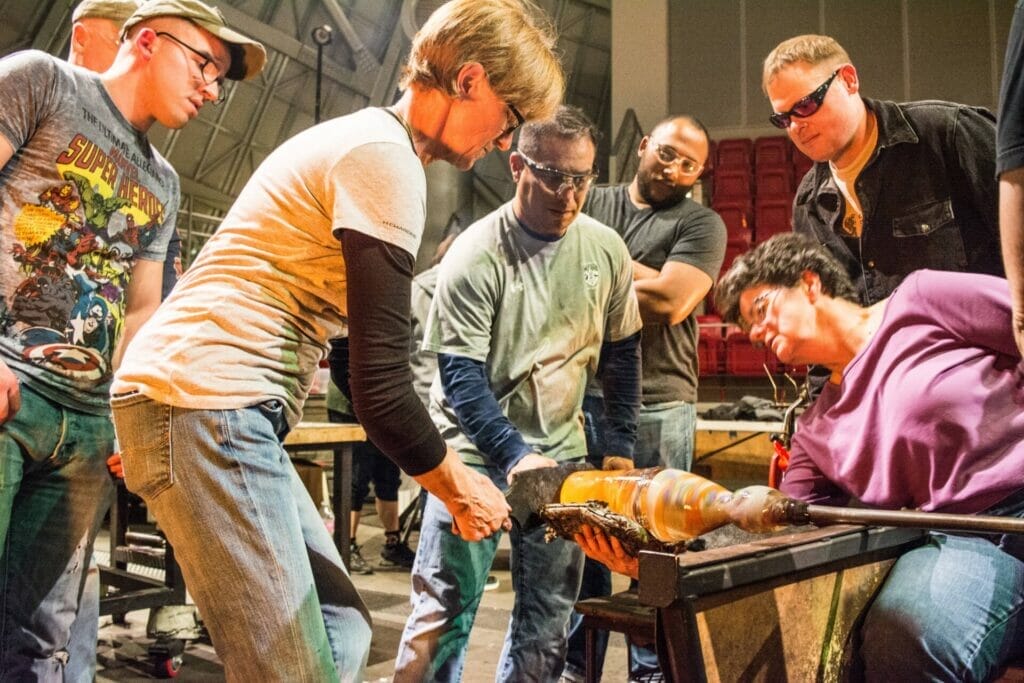
Hot Shop Heros™ Celebrates 10 Years
One of Museum of Glass’s landmark community programs, Hot Shop Heros™, is celebrating its 10th year. The program utilizes therapeutic qualities of glassblowing to serve the military community. When Tacoma native and world-renowned artist Dale Chihuly rented the Museum for soldiers’ and their families on President’s Day in 2013, Lieutenant General Robert Brown of Joint Base Lewis-McChord (JBLM) hoped this connection between the military and MOG would grow. Later that year, MOG partnered with the Soldier Recovery Unit (SRU) at JBLM to create a program that would not only teach soldiers glassblowing skills, but also serve as a form of art therapy for those returning from combat. As a result, Hot Shop Heroes™ was born.
“I have personally seen the transformative nature of Hot Shop Heros. There are students that have come in the first day barely communicating, and over time, I have seen the smiles start to creep in when they come to the class. I have seen some students find a renewed love and sense of purpose and remember what it is like to be in the presence of others. Whether it’s the community-focused aspect of the program or working in a team environment again with other active military and vets with similar challenges, the students find something that affirms life in our program,” said Hot Shop Heroes Program Manager Jabari Owens-Bailey.
Hot Shop Heroes is a core education program at Museum of Glass, offering eight-week glassblowing and flameworking classes to participating soldiers at introductory and intermediate levels. During Hot Shop Heroes’ pilot classes, the program served SRU soldiers with complex and devasting physical and mental injuries. The attention and teamwork needed to blow glass can be therapeutic, especially for individuals with traumas and injuries that have occurred during military service.
“Hot Shop Heroes to me is not only a place to be educated about glass, but a place to go to have the camaraderie with people that you are familiar with. For people that are transitioning from ethe service, some who have been in the service for 10 to 20 years, it’s quite a change. When they offered the class to me, I didn’t want to be in group sessions. I wanted to do solo work, but really found out that glassblowing is a team effort. And now I do enjoy that aspect of it. And now, as I’ve gained great friends, and become more involved going to more classes, I became an instructor myself. Art can be very helpful. It has provided me the opportunity to look outside myself and reflect on things that are good for me,” said program participant and instructor John Obermiller.
The program is particularly effective for participants with Traumatic Brain Injury and Post-Traumatic Stress Disorder. Previous participants have identified the social and emotional benefits of Hot Shop Heroes, recognizing that through the team environment, they have become open to the joy in creating art, coping with anxiety, and interacting with others in a healthy manner.
With classes designed around different levels of glassmaking skills, Hot Shop Heroes allows participanst to continue honing their skill sets, which reach beyond the walls of the Museum’s Hot Shop studio to new job opportunities.
Hot Shop Heroes relies on outside funding to continue providing classes to soldiers and veterans. There is no cost for participating students.
Classes are Monday (Beginner Course) and Wednesday (Intermediate Course) evenings at 5:00 pm for 8-week fall, spring, and winter sessions. During the summer months the Museum runs a production class where the participants create work that is sold in the Museum Store with half of the proceeds benefitting the program.
Museum of Glass is proud to be a Blue Star Museum.
Museum of Glass is located at 1801 Dock St, Tacoma
Hot Shop Heroes™ Celebrates 10 Years
ShowCase Magazine
Community Military Program, Joint – Base Lewis McChord, Pierce County, Art and Culture, Glassblowing